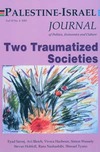It is our hope that the mental health professionals of the warring factions will do even more to encourage a peaceful solution to the conflict. In the words of Eyad Hallaq, we should, "...[encourge] cooperation and network building between different professions and professionals, especially in the city of Jerusalem, a city that should be a model of tolerance, peace and human integration..." The international umbrella provided by the WHO's Department of Mental Health and Substance Dependence to this issue could provide further sustenance to construct bridges in the mental health domain.
This issue of the Palestine-Israel Journal is a concrete step towards bridging the gulf that separates two peoples. In documenting the professional challenges faced by mental health experts on both sides, one point clearly emerges - in an armed conflict, no one comes out psychologically unscathed. No one. There is no one the victim, everyone is a victim. Not all suffering leads to psychiatric disorder, as Professor Wessely rightly points out. But some of it does, and mental health services should be ready to treat and rehabilitate the sufferer of a trauma-related psychiatric disorder.
We are indebted to the editors of the journal for having given us a platform to express ourselves, to the WHO for providing the funds to publish this issue, and to the authors who responded positively to our invitation without reservation.
Dr Mahmud Sehwail, Ramallah
Dr Itzhak Levav, Jerusalem
Focus Section Coordinators for this issue

